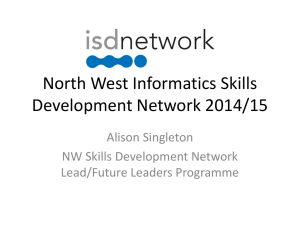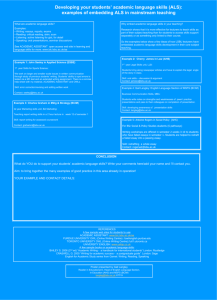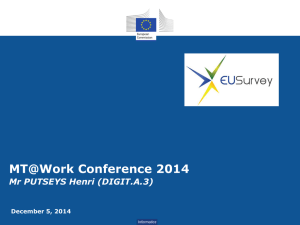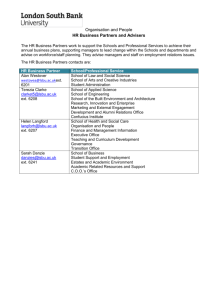Dr. Safia Barikzai
advertisement
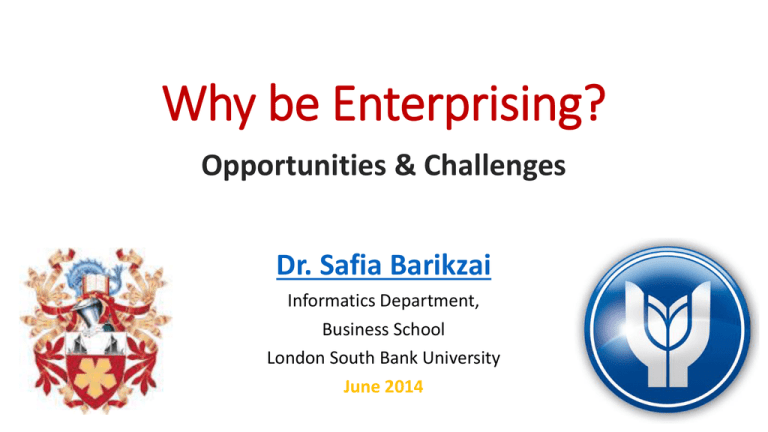
Why be Enterprising? Opportunities & Challenges Dr. Safia Barikzai Informatics Department, Business School London South Bank University June 2014 Contents Introduction Dr. Safia Barikzai London South Bank University Informatics & Business School UG & PG Curriculum Collaborations: Teaching, Research and Enterprise Enterprising Students What is Enterprise? Why be Enterprising? Challenges Opportunities Dr. Safia Barikzai Senior Lecturer in Informatics Course Director: Business IT (Student) Enterprise Champion Contact details….. Email: Safia.Barikzai@lsbu.ac.uk born in Kabul, Afghanistan with International educational experience Lecturer in Computing, Wollongong University, Australia 2002 - 2005 London South Bank University -Established over 120 years ago -University status 1992 -24000 Full-time & Part-time students -SE1 Central London Location - close to the business district & government Currently 4 Faculties - Business - Engineering - Art and Human Sciences - Health and Social Care Spot light on LSBU http://www.youtube.com/user/Londonsouthbankuni What our students say…. http://youtu.be/3QZxS2wBuyM Business School & Informatics Business School has four Academic Departments - Informatics - Accounting and Finance - Business - Management Informatics • Dr. Kevin Grant (Head of Informatics) • Putting the I into Business • Information • Invention (Technology) • Innovation (Technology) • I[e]nquiry • Income Informatics: Value Proposition • Employer endorsed & professional body accredited • Technologists educated to understand, enable and transform business via technology and innovation applications; • ‘Bridge and ladders’ approach to our curricula design allowing students to enter at different stages but still achieve the same end point - a career in informatics; • Authentic based assessment, taught by a mix of academic and commercially aware and active staff from the world of ICT; • Focus on problem based learning enabled by technology; • Focus on Capstone and value adding events ( the last four being big data, cloud computing; cyber defence, leadership, etc.); • Leveraging expertise is BI, Strategic IS; Mobile Apps to industry; Informatics: Value Proposition • Co-created, use inspired research orientation with practicing informatics managers to add value to the curricula and enterprise activities; • Curricula is informed by the the nexus between theory and practice of informatics; • Undertake a placement or internship and study aboard • Focus on start your own IT business through the Dept and the University’s entrepreneurial resources • Practical and pragmatic informatics, with access to over 5000 successful graduates of informatics and a dynamic professional network to tap into; • A shift from just providing a degree to career support via the Informatics Society Informatics UG & PG Curriculum • Offer Undergraduate, Postgraduate and PhD programmes • Over 500+ students • Newly validated courses • More business flavour then traditional Computer Science & Computer Engineering Web Links: http://www.lsbu.ac.uk/courses/course-finder?query=informatics Collaborations: Teaching, Research & Enterprise enterprise Requirements engineering innovation LSBU & Yasar: Opportunities for Students Student Enterprise Summer in London Identifying common research areas. - Cyber Security - Social Media - Internet and databases - Business Intelligence Why be enterprising? Opportunities & Challenges Inspire Engage Enable Up-skill Start-up enterprise capability QAA (2012) Enterprise and entrepreneurship education: Guidance for UK higher education providers …moves beyond skills development to a sense of practical action. …the ability to develop ideas & identify opportunities. …to be a problem solver and be a critical thinker. …it is about taking the initiative & making a difference. Enterprise education is defined as the process of equipping students (or graduates) with an enhanced … capacity to generate ideas and the skills to make them happen…. Entrepreneurship education equips students with the additional knowledge, attributes and capabilities required to … apply these abilities in the context of setting up a new venture or business… Inspire: Start & Evolve • Free talks with entrepreneurs • Networking and drinks • Students can obtain Certificate In Enterprise Enable: Entrepreneurship in Action (EiA) • Support for current students to develop enterprise skills • Test a project/business idea alongside their studies • Any subject, any stage of studies • Students who win a place on the scheme receive: • 12 months free office space • £500 start-up grant • Access to networks Start-Up: Graduate Entrepreneur Scheme • 12 month scheme: develop innovative product or service and commercialise it • LSBU graduates in the last 5 years • Graduates get access to: • Start-up funding - Access to mentoring • Intensive training - Networking opportunities • Legal and IP advice - Office space • Business address - Peer group Other activities • • • • • • • Competitions 1-2-1 sessions Entrepreneurs in Residence Social enterprise Access to networks Experience working in a start-up business South Bank Entrepreneurs (SBE) Contact LSBU Student Enterprise Clarence Centre for Enterprise & Innovation studententerprise@lsbu.ac.uk @lsbu_enterprise Enterprising Challenge What would you like to happen to make your life as students better? What technology solutions would you need? Use the template on the next slide to propose your business case for the change…… Business Canvas Model explained…. 1.Customer Segments: Who are the customers? What do they think? See? Feel? Do? 2.Value Propositions: What’s compelling about the proposition? Why do customers buy, use? 3.Channels: How are these propositions promoted, sold and delivered? Why? Is it working? 4.Customer Relationships: How do you interact with the customer through their ‘journey’? 5.Revenue Streams: How does the business earn revenue from the value propositions? 6.Key Activities: What uniquely strategic things does the business do to deliver its proposition? 7.Key Resources: What unique strategic assets must the business have to compete? 8.Key Partnerships: What can the company not do so it can focus on its Key Activities? 9.Cost Structure: What are the business’ major cost drivers? How are they linked to revenue? The Canvas is popular with entrepreneurs and intrapreneurs for business model innovation.


